- Will the cost of a freeze dryer be going up or down soon? Freeze drying technology has, unfortunately, been very expensive. The initial freeze dryer we introduced just a few years ago was $5,000, but we keep doing our best to make it more affordable and now units start at $2195. With that said, our cost to produce a home freeze dryer has increased by 25% this past year due to tariffs and increased component costs. We are trying to keep prices low, but, eventually, we will most likely be forced to increase the cost of our freeze dryers. However, the combined cost to purchase and ship a freeze dryer was recently reduced, so it really is the best time to buy a one.
- Why would I need a supply of freeze-dried food? Having a supply of emergency food allows you to be prepared for any situation. Most people will experience some type of serious disaster in their lifetime. Just watch the news to hear examples of such disasters including political upheaval, viruses, war, financial distress, hurricanes and other extreme weather. Having a supply of freeze-dried food gives you peace of mind in case any worst-case scenario affects you and your family.
- What is a freeze dryer? A freeze dryer allows you to freeze dry food which is the very best method for preserving food – better than canning and dehydrating. People use their freeze dryers for a number of reasons. The most common uses of a freeze dryer are to preserve garden produce, create an emergency food supply, make healthy snacks, save leftovers, and prepare easy-to-make meals.
- How much food can be freeze dried in a year? It is fairly easy to process 4 batches of food a week. If you multiply the number of batches per week, times 50 weeks in a year (taking two weeks off), approximately 200 batches of food can be freeze dried in a year. Since, on average the freeze dryer can produce two #10 cans of food per batch, that is the equivalent of 400 cans of food per year.
- What is home freeze-dried food worth? If one were to purchase good quality emergency preparedness food such as freeze-dried fruit, meats, vegetables and meals (not dehydrated noodles with some freeze-dried food in them), on average, it would cost at least $35 per can and, probably, much more. A freeze dryer is easily capable of producing four hundred #10 cans of food in a year. If you multiply that (400) times the value per can ($35) you get the value of a year’s worth of home freeze dried food to be equal to or greater than $14,000. *For more cost comparison between home freeze-dried food and store-bought emergency preparedness food see the charts below.
- How much effort and time does it take to freeze dry your own food? If a person can cut up food and press start, they can run a freeze dryer. The unit is automatic and beeps when it is done. Once the batch is finished, just pour the food into a Mylar bag, add an oxygen absorber, and seal the bag. Freeze-dried food is shelf-stable and can last up to 25 years.
Return on Investment: This table compares store-bought preparedness food to freeze drying your own at home with a Harvest Right Freeze Dryer.*The cost of purchasing emergency preparedness food versus freeze drying it at home is 70% to 80% greater.
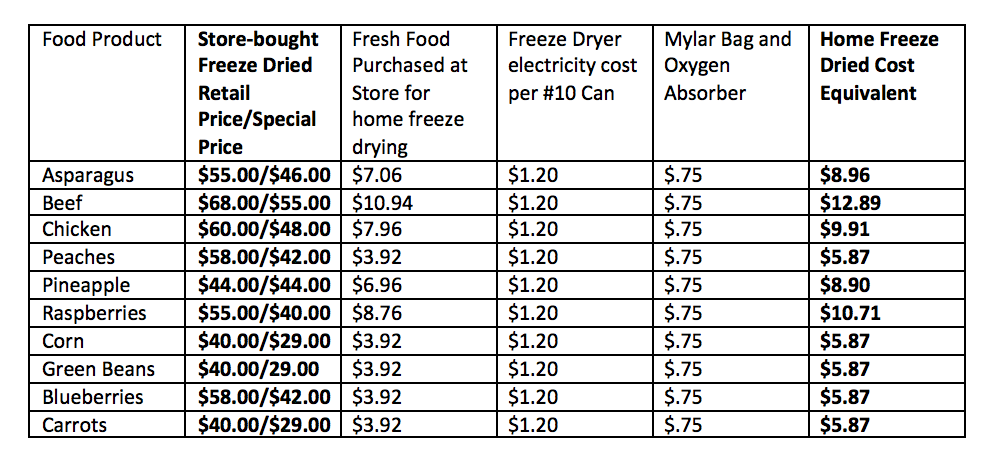
See the following graph to better view the comparison between store-bought and freeze-dried food at home with Harvest Right:
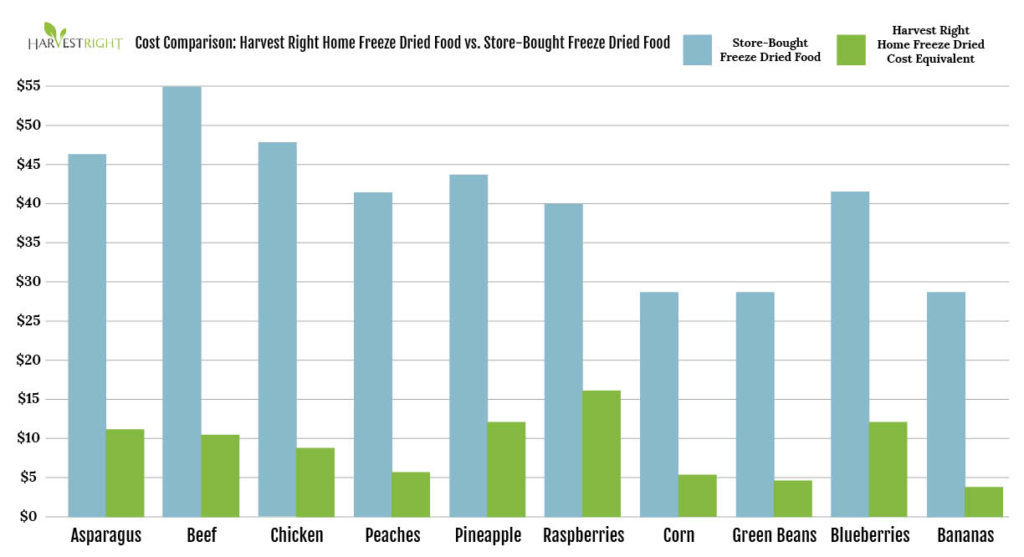

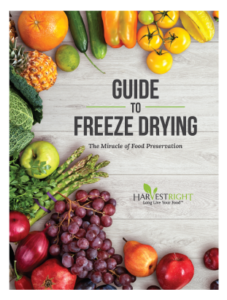
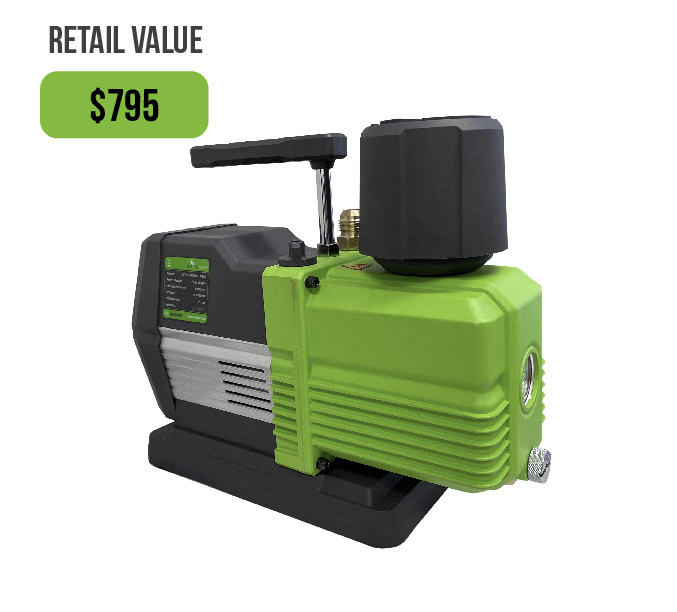
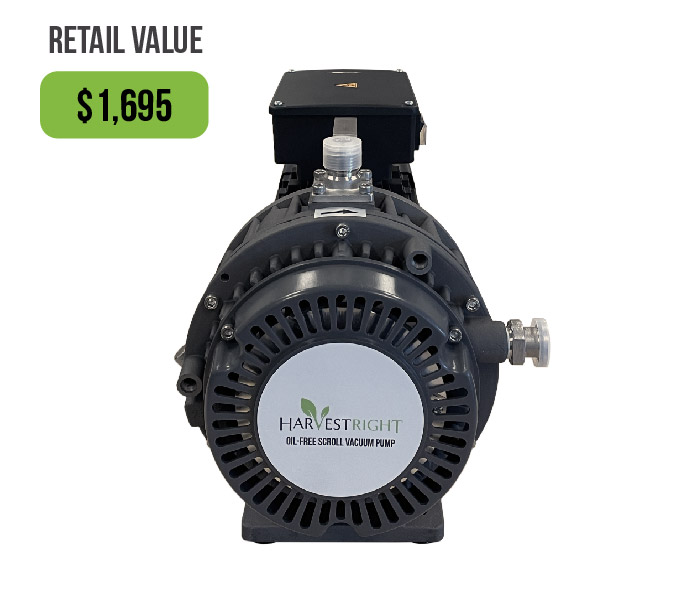
Is someone from your company going to be at the MOTHER EARTH NEWS FAIR in Belton, Tx this weekend?
I would like to show my husband how it works etc.
Thank’s for this information that will be very handy.
Q: If you dry-freeze coffee is it the same as instant coffee.
please reply Roger
Yes. It is instant coffee.
Do you freeze dry the grounds or the coffee itself?
You freeze dry the brewed coffee.
can you freeze-dry frozen chicken
Yes, it will actually speed up the freeze drying if the food is pre-frozen.
I don’t have a freeze dryer yet. But I’m saving to purchase a unit.
In my experience, freeze dried fruits, nuts, and vegetables are tasty snacks direct from the Mylar storage bag!
I’ve never been disappointed by freeze dried food…!
Can you run a second cycle from start to finish if the food isn’t completely dry?
Refreeze and start the process all over.
I’ve read that fats are not recommended for freeze drying. Yet I’ve seen dried butter and full fat milk. Can it be done with your unit? And could you do cream? Thanks!
What are the dimensions of the medium and large units?
How much space would they take up with the motor?
Medium Dimensions
18″ W x 21.25″ D x 28.5″ H
112 lbs.
Large Dimensions
20.25″ W x 23.75″ D x 30.75″ H
138 lbs.
Vacuum Pump:
10-1/2″ H x 16″ D x 5-3/4″ W
35 lbs.
Are the pans in the freeze dryer the same depth and length in the small as compared to the medium or larger freeze dryer
No, they differ between the sizes.
Small: 7.75″ W x 14″ L x 0.75″ H
Medium: 7.5″ W x 18″ L x 0.75″ H
Large: 9″ W x 20.5″ x 0.75″ H
Is shipping included in the purchase?. If not what’s the cost to ship?
Shipping is currently included in the price (for all customers that live within the Contiguous United States).
If I am not home when my product is done, will my product be ruined?
No, it won’t be ruined. When the final dry cycle is over, the machine goes into a freeze so the ice inside doesn’t melt into the food. The freeze dryer will patiently wait for you to unload it. 🙂
This is good! My food is not done and I need to go to bed, so it’s ok if I do the Mylar bag food storage tomorrow?
What we’ve found is that having the food frozen after it’s been dried, does not make for good mylar bag packing. Why? Because the cold draws moisture out of the air. What’s a better way is to lengthen the time after the Final Dry so it stays at about 125 degrees. That way, it’s not going to attract moisture when you take it from the dryer, and packing it is a lot simpler. Also, you don’t freeze your hands.
NOTE: It’s normal for the trays to be cold around the edges because there’s a ring of ice inside the drum and outside the trays. Only the trays are kept hot, not the drum.
I add time to my freeze dryer all the time so that the food is ready when I am. Also, even if I am not home, I know the food will wait for me to take care of it when I am able. The food will be kept in stasis until you are ready. I love my freeze dryer.
What is the energy usage?
Small and standard freeze dryers use a standard 110 volt outlet.
At peak, the freeze dryer draws about 16 amps, but on the average about 9 to 11 amps (990-1210 watts) of power per hour. A dedicated 20 amp circuit is recommended. Your freeze dryer will cost an estimated $1.25-$2.80 a day, depending on power costs in your area.
Large
Our large freeze dryer requires a 110 volt (NEMA 5-20) outlet
At peak, the large freeze dryer draws about 16 amps, but on the average about 10 amps (1500 watts) of power per hour. A dedicated 20 amp circuit is required. Your freeze dryer will cost an estimated $2.00-$3.00 a day, depending on power costs in your area.
I need to change the ‘cost’ per day from dollars to kWh because power is provided by the kWh cost & my cost is tiered, changes depending upon usage. I have a daily allowance after which the cost escalates by around a dime per kWh, then cost doubles, all depending upon my usage. So, I know how much power I use now, I need to know how many kWh the medium unit will increase my use. If I read correctly, it uses up to 1210 watts per hour making that 29.04 kWh for 24 hours of use or about 1.21 kWh per hour. Is this correct?
The you tube channel, RETIRED AT 40 , has great videos that go into a lot of depth about this topic . If you like want the amount of detail and tech he uses to show energy usage.
I heard it takes months to recieve once purchased. How long is shipping once ordered?
The site currently states that the freeze dry units take approximately 10 weeks to ship and if only ordering accessories its 1-2 weeks.
I don’t see much information about freeze drying garlic. Depending on the type of garlic, 4 months to 10 months are the limits for normal storage.
Any info would be appreciated.
We do garlic every year and grind it for powder. Works great.
Approximately how long does it take to process a batch?
Typically 20-36 hours. It depends on what you are freeze drying. If you pre-freeze the food it will freeze dry faster.
I’d love to know if you can freeze dry chutney?
Plug. I bought a large. Do I need to do anything to my electric to use it?
The large is 110V power, but needs to be on a dedicated 20 amp circuit.
Can I use only one tray at a time? Or do I have to fill all four trays in order to run a batch?
It is best to run all four trays if possible. If you have 1 tray prepared you can put it in the freezer and wait until you have 4 ready to go. Sometimes I will put 1 tray in the freezer each day until we can run a full batch!
Greetings:
Is it possible to freeze dry butter, cream? Is there anything that isn’t freeze-dryable?
Do you have to defrost between batches? what is the best procedure to follow if you have several batches to freeze dry?
I alway it “no defrost” on mine. I put a table top fan in front of it and turn it on. My ice comes loose in about 15 minutes. I pull it out and am ready to go back in with the next batch. Usually about 30 minutes down time and my next batch is going again.
On your graph at the top the total is incorrect for asparagus by 5 cents.
Can you freeze dry ice cream?
Do you have to use bags to store items or can you use jars too?
Yes, ice cream freeze dries very well! You can use jars or bags. Your freeze dryer comes with mylar bags, oxygen absorbers, and a sealer included.
How did you do the ice cream? What flavors work best?
Should the freeze dryer be powered off between batches if it might be a couple of days?
Is it okay to run my freeze dryer in the same room that I am using to store my canned goods and preps?
Will the large Harvest Right FD operate correctly if the whole unit is inside of a freezer?
This is not recommended because most freezers get below 0 degrees F.
can the machine itself be stored in temps below freezing when not in use? Thank you!
Does your units need to be in the house( air and heat) or can I put in my garage… no air/heat. Thanks
Most people put them in their garage or a utility room. High temperatures could increase batch times. So, depending on your area you may want to bring it inside for a few months of the year.
I’m about to purchase one now but was wondering if I can use my tax id ? I can’t find a location to input it or any forms
What size table top is needed for the large unit and the pump?
Can you freeze dry zucchini tossed with olive oil and ranch dressing seasoning for long term storage?
Did you try this? Did it work? I did it without olive oil but the seasoning didn’t stay that well.
I did several batches of zucchini chips. One I sprinkled pink salt on before I placed in freezedryer. Second I did salt and vinegar chips, third I marinated zucchini in ranch overnight then freeze dried all if the batches came out full of seasoning and flavor without any olive oil added.
I am excitedly awaiting delivery…my husband asked if there is a humidity spec for using the unit outside in the garage versus inside the house.
What is the minimum clearance from side to side or back of unit?
If I buy a pharmaceutical unit but will be drying larger items, can I just leave some trays out?
The frame inside that holds the trays is one piece. Your tray slots will still be too narrow for larger items.
I had a power outage early in the morning and it was in the hour to 2 hours of drying, the freeze dryer did not pick up where it usually does. If the food is almost dry, is there a way to run just the dry cycle instead of a entirely new cycle?
Can I FD previously dehydrated food or previously dried fruit such as raisins or dates?
How much heat does the HarvestRight freezedryer put out?
Quite a lot. We have multiple and determined we need 2500 BTUs of cooling per machine with plenty of circulation to keep them happy.
Will it harm the freeze dryer if you run it constantly? Is it okay to freeze dry multiple batches, one after the other?
Yes, it is great to run it all the time!
Can high fat items, such as bacon or sausage be freeze dried?
My wife and I are thinking about putting our harvest right downstairs in our gym/workout room. We are wondering if it might put off too much heat to make the gym room too warm to work out. Also, is it loud that it would make it unbearable?
Can I transport the Large freeze dryer on it’s side if I don’t have a truck? Then when I get to final location have it up right for a 24hrs before use?
This isn’t normally recommended, but if there is not another option for transport make sure you wait 24 hours before operation.
I have a medium that I have to transport on its side (left/right) or back due to height restriction in truck bed. My question is, which would be the best option aside form standing up? I understand the need for the 24-hour rest before use following transport.
Do I need to defrost before every cycle? Or can I start the next batch immediately afterwards?
Typically it is recommended to defrost between batches unless you are freeze drying something that has very little moisture like candy.
We brought a freeze dryer almost a year ago – never used per waiting to get into a home to have space to use it. It was stored in a climate controlled storage unit until recently. Can a machine that hasn’t been used and isn’t being used be stored in freezing temperatures?
After the machine freezes then it goes to vacuuming. Is it normal for it to go back to freezing for as much as an hour then vacuum again?
Yes. Your freeze dryer is smart. It will adjust as necessary. This actually ends up making the process faster because assuring that the product is froze properly makes the warming cycle faster.
Hi. I purchased a unit about a week ago and still waiting for it to be delivered but I am only seeing recommendations for the mylar bag and oxygen absorber, is it possible to store the food in mason jars with the oxygen absorber too? Does it need to be vacuum sealed? Could food be stored without the oxygen absorber in a jar, for say dried herbs etc?
Mason jars with an oxygen absorber is another great way to store the food. For longer storage it is best to keep the jars in a cool, dark location.
I was not able to remove my last batch of blueberries when the batch was finished but the machine kept the berries froze, so I added an hour more drying time, my question is should the trays be warm after you add more drying time cuz mine were not they were cold?
At the end of the drying process there is time when the heaters are not on. Because of that, the trays are not typically warm when you pull them out.
My FD has an option to warm the trays. If your trays are really cold, warm the trays – By warming the food in the vacuum, it is much less inclined to pull in warm air around the food and with it moisture from that air.
Should the freeze-dryer be switched off or unplugged if its not going to be used for several days?
How should the freeze dryer be stored while not in use? Unplugged and covered?
If not being used for an extended period of time it is good to do the following: Unplug the freeze dryer, cover it, and make sure the vacuum pump has fresh/clean oil in it.
Thank you Matt for your helpful reply.
What’s the volume of a #10 can in millilitres?
A #10 can is equal to 1 gallon. That is: 3,785 milliliters
After batch is done do I need to close fd door to vent oil free pump?
Thank you
When doing a Freeze Dryer load, do I need all four trays filled up?
I have a medium freeze Dryer. I defrost after every batch. Can you give me a window of how long the defrost cycle lasts? My machine is in my out building and I just can’t go there frequently enough to find out when it quit.
Thanks for your time
You can set your own defrost time; if I have a heavy load of ice (from soups or stews), I defrost for over 2 hours. If it’s a lighter load, like cheese, which has maybe half the ice buildup that stew does, an hour or 1-1/2 hours works just fine. (Just set your own time, and go out to your building when you have set it to end.) Even if there is still some ice, it is generally loose and simple to just pull out. Hope that helps.
We just got our Harvest Right and did the bread test . We just left the settings as the were. Except for candy mode are we supposed to change the settings or modes? We want to do milk and eggs next.
Several of my bags (filled with various foods – one food item per bag – and each one having the appropriate oxy absorber in it) don’t have all the oxygen sucked out in the bags. Is this normal for some to seal like solid bricks and others to be more loose? I have sealed all of them properly with brand new oxygen absorbers and have inspected each bag to verify no holes or leaking (that is apparent).
Because our atmosphere is roughly 19% oxygen (it is comprised of oxygen, nitrogen, helium, etc.) , you will only see the bags “cave in” slightly. Not to worry, because the oxygen is the only thing we need to make sure gets removed.
Whether or not the bag sucks in depends on the density of the food, how tightly it is packed in the bag, and how much available air is left in the bag. It doesn’t really matter though.
Approximately how many loads can a freeze dryer do in its lifetime?
How long does FD herbs, tomato sauce and meat last if left In zip locks or Tupperware?
I worked in military aerospace for 30 years. Any equipment that we wanted to keep free of moisture was kept in mylar bags with an aluminum coating; it was protected against vapor intrusion for between 10 and 20 years. A water molecule is so small that it can work its way through/between molecules of plastic (zip lock/tupperware)–it won’t las as long.
Just purchased a large HR freeze dryer and would like to put it on a mobile stand with the vacuum pump on an underneath shelf. Is this a good idea or should I go back to the drawing board?
I put mine on a cart with 4 wheels its called a Master Force utility cart. It holds the Moter, Mylar Bags, Oxygen Absorbers and the oil changing items. New oil, oil filter, funnel and anything else I may need. I use the drawer for a notebook about what I have done and recipe books about freeze drying. I love it. Hope this helps.
Are your freeze dryers NSF listed?
I always have trouble getting the shelving unit back in all the way after cleaning. The fat plug is in the way. Any suggestions?
I move the cord to the side wall of the dryer and hold it there as I slide the shelf unit back in so that the cord loop stays on between the shelves and the drum wall instead of bunching up in the back behind the shelving unit….have you tried this?
After you change the oil do you have to reset anything so it knows and will remind you for the next time?